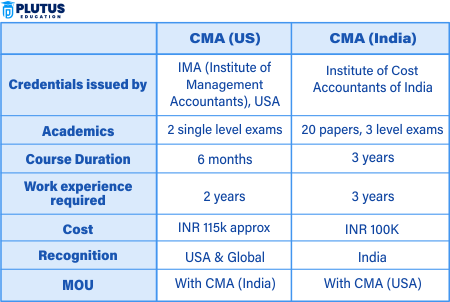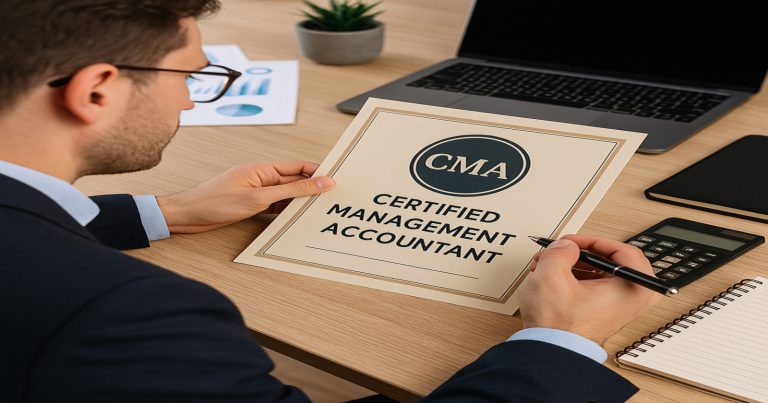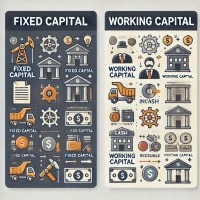The full form of CMA is Certified Management Accountant. This designation signifies expertise in management accounting, financial management, and business analysis. CMAs are professionals who are skilled in areas like financial planning, performance management, and cost management. CMA is certainly one of the professional certifications that hold great value in the finance and accounting world. In this blog, we are going to dig into CMA full form, its relevance, benefits, and career prospects that come along. In the finance and account sector, professional certification holds a great value, and CMA stands on top of them.
CMA Full Form
The Institute of Cost Accountants, popularly known as ICMAI, in India manages the Cost and Management Accounting course. In the earlier days, the full form of CMA that is Cost and Management Accounting was termed as CWA that means Cost and Works Accounting. The regulatory body in India was not changed; but ICMAI was referred to as the Institute of Cost and Works Accountants of India (ICWAI). This course is ideal for students who are interested in managing and consolidating accounts in the different departments of a company in order to cut down costs. The time taken for the CMA course is three years.
What is CMA Course?
CMA, or Cost and Management Accounting, is a certificate course that provides a CMA designation to the qualifiers. This, therefore, is an entrance into an excellent career in business accounting. Four pillars of knowledge for the CMA course include management, regulatory framework, strategy, and financial reporting. A CMA designation is received once the candidate qualifies for the CMA exam that is conducted at three levels mentioned below.
- Level 1: CMA Foundation
- Level 2: CMA Intermediate
- Level 3: CMA Final
CMA Course Eligibility Criteria
Eligibility criteria to apply for the CMA exam at all three levels is different. CMA course eligibility criteria for all three levels are mentioned below:
CMA Foundation Eligibility Criteria
- Passed Class 10 or equivalent followed by Class 12 or equivalent
- If they have received National Diploma in Commerce Examination (AICTE or by any recognised board)
CMA Intermediate Eligibility Criteria
- Passed SSC or equivalent
- Foundation or fresher level of Common Admission Test (CAT) by Institute of Cost Accountants of India (ICAI)
- Graduation in any discipline except Fine Arts
- Even the students awaiting result shall clear CMA course eligibility
CMA Final Eligibility Criteria
- Students who have completed Intermediate level school
- Graduation in any discipline except Fine Arts
- Have cleared all eight papers of Intermediate course
Benefits of CMA Course
Besides providing technical accounting information for students, the CMA course equips one with strategic thinking skills, which are applied in leadership capacities within the financial sectors. The CMA course is thus beneficial to anyone seeking to establish positions in leadership capacities within the financial and accounting sectors.
- Enhanced Career Opportunities: CMA certification is widely accepted by multinational corporations, making it easier to pursue a global career. Certified CMAs have better job prospects in sectors like finance, banking, and manufacturing.
- Higher Salary Potential: Professionals with a CMA certification often earn higher salaries compared to non-certified peers. The designation is linked to increased earning potential due to its focus on strategic financial management.
- Skill Development: CMAs gain expertise in financial analysis, planning, and decision-making skills, which are crucial for managerial positions. Emphasizes practical skills that help in effective cost control and risk management.
- Networking Opportunities: Joining professional organizations like IMA provides networking opportunities with fellow professionals. Access to exclusive industry events, webinars, and resources that aid in career advancement.
Different Courses in CMA
As part of the CMA course, there are several training courses that the aspirants go through, giving them a clear learning path in terms of mastering concepts on management accounting and financial analysis. Since these courses are designed with a view toward providing end-to-end management accounting, financial analysis, and business strategy knowledge, they are very comprehensive.
- CMA Foundation Course: Focuses on basic concepts in economics, business mathematics, and accounting. Ideal for beginners with no prior knowledge of finance and accounting.
- CMA Intermediate Course: Covers more advanced topics like cost accounting, financial management, and taxation. Designed for students who want to gain a deeper understanding of the financial principles.
- CMA Final Course: Emphasizes strategic management, financial decision-making, and global taxation. Prepares candidates for higher-level positions in finance and management.
- Online and Classroom Learning: Offers flexibility with online classes and self-study options for working professionals. Classroom training is also available for those who prefer a structured learning environment.
Scope of CMA in India
CMA offers a very wide variety in terms of career options-they let you work in lots of sectors-finance, accounting, and manufacturing—and can even be a consultant. They offer excellent opportunities for wealth and scope for moving towards manager and executive jobs.
- Financial Analyst: Analyzes financial data to help companies make informed business decisions. Develops strategies to increase profitability and reduce costs.
- Management Accountant: Focuses on internal financial analysis and decision-making within an organization. Assists management in budgeting, financial forecasting, and performance evaluation.
- Cost Accountant: Specializes in managing and controlling costs within a company. Plays a critical role in pricing, cost control, and inventory management.
- Chief Financial Officer (CFO): Leads the financial strategy and operations of a business. Responsible for financial planning, risk management, and strategic decision-making.

Top Institutes for CMA in India
Various institutions of India provide certified management accountants. Also, any organizations and universities provide this certificate on a personal basis. Here are the top 5 institutions cataloged that provide this certification course.
- Global Smart Infotech & Education in Chennai
- Ajay Verma CMA Classes in Delhi
- ICWA CMA Classes in Mumbai
- Edmiron in Kolkata
- Edline in Kolkata
CMA Course Fees
The price of CMA courses is different based on the provider and the variety of resources included like study materials, practice exam access, and other support services. These prices are an investment in a professional certification that can have a huge impact on career opportunities and income.
| Fee Type | Student/Academic Members fees | Professional Members Fees |
| IMA Membership Fee | 4,148 INR | 24,977 INR |
| Entrance Fee | 19,051 INR | 25,401 INR |
| Exam Fee (per part) | 31,328 INR | 41,912 INR |
CMA vs. Other Accounting Certifications
CMA and CPA (Chartered Public Accountant) or ACCA (Association of Chartered Certified Accountants) are not very similar. There are many differences between the two.
CMA is primarily concerned with management accounting and strategic decision-making as opposed to the CPA that may be more concerned with auditing, tax, and financial accounting.
The ACCA is of an international scope compared to the CMA, which is specialized in corporate finance and management accounting.
It depends on your career goals on which choice you have to make. If you are looking at working in a corporate finance setting and want to move into high-level leadership positions, then the CMA would be the better fit.
Conclusion
The CMA is a shortened form of the term Certified Management Accountant, an elite certification for any professional seeking to work in finance and accounting. Whichever your current path or career direction, getting certified can help you achieve skills, recognition, and opportunities to succeed in the today’s fast-paced world of business.
By knowing the CMA full form and what it means, you will already be half-way to taking the right decisions regarding your prospective career in finance. So, if you’re considering a future in management accounting or finance, pursuing the CMA could be a pivotal step towards achieving your career goals!
CMA Full Form FAQs
What is the full form of CMA?
The full form of CMA is Certified Management Accountant .
What is CMA in salary?
Since CMA-certified individuals oversee financial and accounting management for businesses, their salaries are quite rewarding. The estimated salary range for a Certified Management Accountant is between INR 1.4 LPA and INR 20 LPA, with an average of INR 6 Lakhs offered per annum in India.
Is CMA easy to pass?
The CMA exam is considered difficult, with an average pass rate around 45% for each part. While the exam is challenging, it’s achievable with proper preparation and study strategies.
What are the eligibility criteria for the CMA course?
Passing class 12th is a must for the Foundation course and a Bachelor’s degree is required for the Intermediate level .
Can 12th pass apply for CMA?
After passing the 12th standard, students can enroll in the CMA Foundation Course. The eligibility criteria include: Passing the 10+2 examination from a recognized board. There is no upper age limit for registration.
Is CMA better than CA?
Whether a Certified Management Accountant (CMA) or Chartered Accountant (CA) is better depends on your career goals and interests. Both are highly regarded in accounting and finance.


